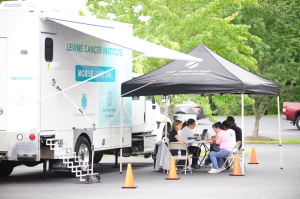
With BodyTom, the lung screening process
takes about twelve minutes. Patients
receive results within 24-48 hours.
takes about twelve minutes. Patients
receive results within 24-48 hours.
Low-dose, mobile CT technology powers the future of lung care
October 03, 2018
By Mellisa Wheeler, BSW, MHA
When the first mobile stroke unit dispatched in Houston four years ago, it motivated a wave of hospitals adopting the technology for their own facilities. At Atrium Health’s Levine Cancer Institute (LCI) in Charlotte, North Carolina, we were inspired to establish a different kind of mobile unit – one that could address rural North and South Carolina’s deadly combination of high smoking rates and lack of access to lung cancer screenings.
It was a tall order that required a CT scanner with mobile capabilities. Moreover, the scanner needed to have low-dose screening capabilities in order to adhere to the American College of Radiology’s guidelines set forth in 2011 to establish low-dose lung screenings as the standard of care. Our team moved forward and proposed the idea to the Bristol-Myers Squibb Foundation, which provided a grant to make the dream of a mobile lung unit and comprehensive screening program come true.
Since its launch in April 2017, LCI’s mobile lung unit has provided care to many people who might not otherwise have had access. Additionally, the lung screenings have located incidental findings outside of the lungs. Our team has been able to refer these affected patients to other LCI programs for care options.
Covering New Ground
In selecting a scanner, our team considered several factors that were crucial to ensuring the mobile lung unit’s functionality, such as low-dose lung scanning, durability to withstand transit, and its safety in providing patient screenings. Ultimately, the 32-slice mobile CT scanner BodyTom by Samsung NeuroLogica fulfilled all of our requirements.
The system’s resistance to being affected by its environment ensured that the device would deliver high-quality images despite high temperatures, humidity, or the rough road conditions faced on the journeys into rural areas. In our extensive research of CT scanners for the unit, Samsung NeuroLogica’s commitment to understanding mobile technology was evident from their experience introducing Mobile Stroke Units to the world. We knew that we were selecting a partner that thoroughly understood the complicated nuances of bringing a mobile unit on the road.
BodyTom’s ability to deliver high-quality low-dose lung images in real time was also paramount to our decision. Given the time that the unit spends in remote areas that may not have immediate access to emergency services, it was important for us to prioritize safety as well. BodyTom’s shielded workstation delivers 0.5mm of protection for our staff, and internal lead shielding provides another 0.75mm to reduce radiation scatter in the vehicle.
Point of Care Dose Management
Since its first site visit, the mobile lung unit has been providing critical screenings to underserved populations in North Carolina that have some of the highest lung cancer rates nationwide.
Many people within this area do not have access to reliable transportation, so bringing the screenings to them was one way to bridge the access gap. The mobile lung unit also offers the unique opportunity to educate rural healthcare providers about the importance of lung screenings, encouraging collaborative partnerships that will continue to grow in the future.
Having a device with protocols for dose management helps us to resolve patient concerns about the safety of the screening process. As providers, we face challenges due to health literacy and strive to keep our answers as simple as possible, reminding patients that the risk of a late-diagnosed lung disease and/or cancer is much greater than risks from very minimal exposure to radiation during the procedure.
Additionally, the mobile lung unit is equipped with a tablet where we store shared decision-making information that provides patients with helpful information. Prior to the procedure, patients view a short video that reinforces key risks and benefits associated with lung screening, along with information on smoking cessation and healthy lifestyle habits. The tablets also allow our staff to collect vital patient information, such as smoking history, occupation, and occupational exposure on a short survey. We’re using this information to research how we can better serve the communities and people that we touch.
Mobile Lung Units: Future of Patient Care
Given the success rate of our mobile lung unit, we expect to see programs like ours expanding across the country. Already, we’ve received inquiries from facilities beginning the process of incorporating a mobile lung unit into their programs. Questions range from technological – how to make particular equipment and technology work on the road – to logistical – how we determine which locations to serve first.
At LCI, we believe mobile lung units are a model for the future of patient care. Mobile lung units have the potential to save the lives of not only underserved populations, but also the lives of patients with insurance who may not otherwise seek out lung cancer screenings. Convenient, safe, simple, quick, and most importantly, lifesaving, mobile lung units have the potential to change the way caregivers and patients experience lung screenings for years to come.
About the author: Mellisa Wheeler is the director of the Disparities & Outreach program at Levine Cancer Institute, a department dedicated to eradicating the burden of cancer in underserved communities through prevention education, screening and early detection of the disease. She has over 20 years of experience in healthcare with a specialized focus in oncology.
When the first mobile stroke unit dispatched in Houston four years ago, it motivated a wave of hospitals adopting the technology for their own facilities. At Atrium Health’s Levine Cancer Institute (LCI) in Charlotte, North Carolina, we were inspired to establish a different kind of mobile unit – one that could address rural North and South Carolina’s deadly combination of high smoking rates and lack of access to lung cancer screenings.
It was a tall order that required a CT scanner with mobile capabilities. Moreover, the scanner needed to have low-dose screening capabilities in order to adhere to the American College of Radiology’s guidelines set forth in 2011 to establish low-dose lung screenings as the standard of care. Our team moved forward and proposed the idea to the Bristol-Myers Squibb Foundation, which provided a grant to make the dream of a mobile lung unit and comprehensive screening program come true.
Since its launch in April 2017, LCI’s mobile lung unit has provided care to many people who might not otherwise have had access. Additionally, the lung screenings have located incidental findings outside of the lungs. Our team has been able to refer these affected patients to other LCI programs for care options.
Covering New Ground
In selecting a scanner, our team considered several factors that were crucial to ensuring the mobile lung unit’s functionality, such as low-dose lung scanning, durability to withstand transit, and its safety in providing patient screenings. Ultimately, the 32-slice mobile CT scanner BodyTom by Samsung NeuroLogica fulfilled all of our requirements.
The system’s resistance to being affected by its environment ensured that the device would deliver high-quality images despite high temperatures, humidity, or the rough road conditions faced on the journeys into rural areas. In our extensive research of CT scanners for the unit, Samsung NeuroLogica’s commitment to understanding mobile technology was evident from their experience introducing Mobile Stroke Units to the world. We knew that we were selecting a partner that thoroughly understood the complicated nuances of bringing a mobile unit on the road.
BodyTom’s ability to deliver high-quality low-dose lung images in real time was also paramount to our decision. Given the time that the unit spends in remote areas that may not have immediate access to emergency services, it was important for us to prioritize safety as well. BodyTom’s shielded workstation delivers 0.5mm of protection for our staff, and internal lead shielding provides another 0.75mm to reduce radiation scatter in the vehicle.
Point of Care Dose Management
Since its first site visit, the mobile lung unit has been providing critical screenings to underserved populations in North Carolina that have some of the highest lung cancer rates nationwide.
Many people within this area do not have access to reliable transportation, so bringing the screenings to them was one way to bridge the access gap. The mobile lung unit also offers the unique opportunity to educate rural healthcare providers about the importance of lung screenings, encouraging collaborative partnerships that will continue to grow in the future.
Levine Cancer Institute's Mobile Lung Unit, equipped
with Samsung NeuroLogica's BodyTom, can be parked
virtually anywhere and deliver high-quality, low-dose CT
images to patients in underserved populations.
with Samsung NeuroLogica's BodyTom, can be parked
virtually anywhere and deliver high-quality, low-dose CT
images to patients in underserved populations.
Additionally, the mobile lung unit is equipped with a tablet where we store shared decision-making information that provides patients with helpful information. Prior to the procedure, patients view a short video that reinforces key risks and benefits associated with lung screening, along with information on smoking cessation and healthy lifestyle habits. The tablets also allow our staff to collect vital patient information, such as smoking history, occupation, and occupational exposure on a short survey. We’re using this information to research how we can better serve the communities and people that we touch.
Mobile Lung Units: Future of Patient Care
Given the success rate of our mobile lung unit, we expect to see programs like ours expanding across the country. Already, we’ve received inquiries from facilities beginning the process of incorporating a mobile lung unit into their programs. Questions range from technological – how to make particular equipment and technology work on the road – to logistical – how we determine which locations to serve first.
At LCI, we believe mobile lung units are a model for the future of patient care. Mobile lung units have the potential to save the lives of not only underserved populations, but also the lives of patients with insurance who may not otherwise seek out lung cancer screenings. Convenient, safe, simple, quick, and most importantly, lifesaving, mobile lung units have the potential to change the way caregivers and patients experience lung screenings for years to come.
About the author: Mellisa Wheeler is the director of the Disparities & Outreach program at Levine Cancer Institute, a department dedicated to eradicating the burden of cancer in underserved communities through prevention education, screening and early detection of the disease. She has over 20 years of experience in healthcare with a specialized focus in oncology.

